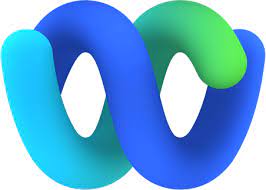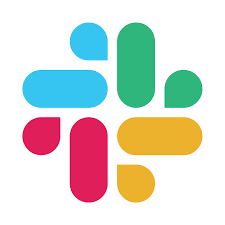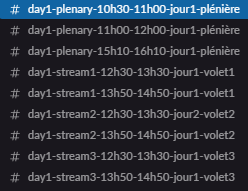Important: The GCConnex decommission will not affect GCCollab or GCWiki. Thank you and happy collaborating!
Difference between revisions of "GC Data Conference 2023/networking"
Samuel.burke (talk | contribs) |
Samuel.burke (talk | contribs) |
||
| Line 163: | Line 163: | ||
<!-- #4 --> | <!-- #4 --> | ||
<div class="mw-collapsible mw-collapsed" style="width:auto; max-width:800px; float:left;"> | <div class="mw-collapsible mw-collapsed" style="width:auto; max-width:800px; float:left;"> | ||
| − | <li id=" | + | <li id="dsn" style="width:350px;"><strong>[https://csps-efpc.webex.com/csps-efpc/j.php?MTID=mafe90072f613f84fa33ee347a1f2bbb8 Data Science Network]</strong></li> |
<div class="mw-collapsible-content">The Data Science Network for the Federal Public Service is a community that builds data science capacity by sharing data science methods across the Government of Canada and the greater data science community. The network allows the public service to benefit from the use of automation and new data sources. Members share information on training, best practices, innovative projects and accomplishments and other data science related themes. | <div class="mw-collapsible-content">The Data Science Network for the Federal Public Service is a community that builds data science capacity by sharing data science methods across the Government of Canada and the greater data science community. The network allows the public service to benefit from the use of automation and new data sources. Members share information on training, best practices, innovative projects and accomplishments and other data science related themes. | ||
<p><strong>Discussion questions</strong></p> | <p><strong>Discussion questions</strong></p> | ||
| Line 214: | Line 214: | ||
<!-- #7 --> | <!-- #7 --> | ||
<div class="mw-collapsible mw-collapsed" style="width:auto; max-width:800px; float:left;"> | <div class="mw-collapsible mw-collapsed" style="width:auto; max-width:800px; float:left;"> | ||
| − | <li style="width:350px;"><strong>[https://csps-efpc.webex.com/csps-efpc/j.php?MTID=m0dbf963e0121789a4478b7d2feacf21d Digital Community]</strong></li> | + | <li id="digitalcommunity" style="width:350px;"><strong>[https://csps-efpc.webex.com/csps-efpc/j.php?MTID=m0dbf963e0121789a4478b7d2feacf21d Digital Community]</strong></li> |
<div class="mw-collapsible-content">The digital community includes people who work in digital disciplines: they have the skills and experience in fields including but not limited to data and information, design, product, and IT/cyber security, development, digital leadership. At the Office of the Chief Information Officer, we find, develop, enable, and recognize digital practitioners, digital executives, and departmental CIO/CDOs. | <div class="mw-collapsible-content">The digital community includes people who work in digital disciplines: they have the skills and experience in fields including but not limited to data and information, design, product, and IT/cyber security, development, digital leadership. At the Office of the Chief Information Officer, we find, develop, enable, and recognize digital practitioners, digital executives, and departmental CIO/CDOs. | ||
| Line 226: | Line 226: | ||
<!-- #8 --> | <!-- #8 --> | ||
<div class="mw-collapsible mw-collapsed" style="width:auto; max-width:800px; float:left;"> | <div class="mw-collapsible mw-collapsed" style="width:auto; max-width:800px; float:left;"> | ||
| − | <li style="width:350px;"><strong>[https://csps-efpc.webex.com/csps-efpc/j.php?MTID=mf5a8b022057c96c8be6b6d1b70737a7d Data Literacy - Digital Academy]</strong></li> | + | <li id="digitalacademy" style="width:350px;"><strong>[https://csps-efpc.webex.com/csps-efpc/j.php?MTID=mf5a8b022057c96c8be6b6d1b70737a7d Data Literacy - Digital Academy]</strong></li> |
<div class="mw-collapsible-content">The CSPS Digital Academy was established by the Canada School of Public Service (CSPS) in 2018 to help federal public servants gain the knowledge, skills and mindsets they need in the digital age. It supports the principles of Canada's Beyond2020 initiative for an agile, inclusive and equipped workforce and advocates for a digital-first approach that aligns with Canada's Digital Standards. These ten digital standards form the foundation of the government's shift to becoming more agile, open and user-focused. | <div class="mw-collapsible-content">The CSPS Digital Academy was established by the Canada School of Public Service (CSPS) in 2018 to help federal public servants gain the knowledge, skills and mindsets they need in the digital age. It supports the principles of Canada's Beyond2020 initiative for an agile, inclusive and equipped workforce and advocates for a digital-first approach that aligns with Canada's Digital Standards. These ten digital standards form the foundation of the government's shift to becoming more agile, open and user-focused. | ||
Revision as of 09:12, 21 February 2023
vExpo | Agenda | Speakers | Discover more about data |
 WebEx
WebEx
- GC Data Community - GC Data Ecosystem
- Are you expecting the GC Data Conference 2023 to inform any of the projects you’re working on?
- Share the strategies you employ or your organization/branch employs to remain up-to-date when it comes to data. (E.g. How and how often do you conduct your environmental scans and how do you use the results of the scans in your work?)
- GC Data Community - Data Talent
- Take stock of past, ongoing, and planned initiatives pertaining to data talent in the GC
- Identify the barriers and enablers to attracting, developing, and retaining data talent
- Design user-centred solutions
- People & Culture Working Group
- What big challenge do you bring to the GC Data Conference 2023? What do you hope to get from the conference and give to the data community?
- What do you hope to get from the conference and give to the data community?
- Data Science Network
- The future of natural language processing and machine learning: Speculate about the potential impact of NLP and machine learning on the government, as well as on industries such as healthcare, finance, and education. Discuss the challenges that must be overcome to realize this potential.
- The impact of data science on society: Explore the ways in which data science is shaping the world around us, from personalized advertising to predictive policing. Discuss the ethical considerations that arise when using data science and machine learning, such as privacy, bias, and fairness.
- The future of data science education: Discuss the skills that will be necessary for future data scientists, and explore different strategies for educating and training the next generation of data scientists.
- Data and Information Management Leaders
- What big challenge do you bring to the GC Data Conference 2023? What do you hope to get from the conference and give to the data community?
- When thinking about the merged communities of Information and Data, what do you think will be achievable in the short medium and long-term?
- Public Sector Experimentation
- Community Building and Learning Resources: Building capacity across the public service for innovative thinking and doing by connecting and sharing tools, new initiatives, and lessons learned.
- Learning Events: Develop and deliver events that champion public sector innovation ideas, skillsets and priorities; build a compelling narrative around innovation
- Learning-by-doing projects: Run experiments that leverage data analytic techniques, automation and AI to address horizontal issues. Provide public servants with project-based experiential learning experiences – learning that sticks.
- What big challenge do you bring to the GC Data Conference 2023? What do you hope to get from the conference and give to the data community?
- What do you hope to get from the conference and give to the data community?
- Digital Community
- Data Literacy - Digital Academy
- develop data competencies in support of a data-literate workforce
- create a common language around data
- create a community of like-minded, mutually supportive individuals
Discussion questions
Three objectives provide the foundation for this project:
The Public Service Commission, a partner in the project, will also showcase its new pilot recruitment program for data scientists and its rich toolbox of resources to support data talent recruitment and hiring.
Our mandate is to transmit the knowledge and value of data to transform the people and culture around data and data literacy. Critical inquiry and reflection on issues and challenges faced by the community provide opportunity for collective intelligence building and collaborative approaches to problem-solving, which can create new ways of thinking and doing. In turn, members can bring back knowledge and ideas to their networks and advance discussions further.
Discussion questions
Discussion questions
Discussion questions
Discussion questions
In this session, you will get a sneak peek at the Digital Community team's progress and connect with peers.
Through the Discover Data series, the Digital Academy aims to:
 Slack
Slack
→ Click here to create an account with the GC Data Conference 2023 Slack workspace. Enter your email address and follow the instructions to create an account.
→ Click here to log in if you have already created an account. Enter the email address you used to sign up and follow the instructions to log in.
Once you're logged in, you'll find a list of channels on the left organized by topic or event session.
You can start by introducing yourself in the #welcome-bienvenue channel, and then chatting in the channel(s) of the session you're attending.
Each channel corresponds to a session at the GC Data Conference. For example, in the below image, the first channel highlighted in blue is for Day 1 (February 22, 2023) plenary session from 10:30 - 11:00 am. Once you've selected that channel, you can begin typing to share your thoughts on the Conference opening with other participants.

If you're experiencing technical difficulties, or would like to learn more about using Slack, please visit the Slack Help Centre.
GC Data Community | Contact us | Subscribe | Join us on GCcollab | GC Data Community Partners

